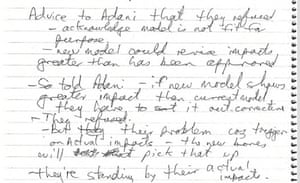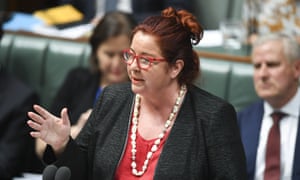Company rejected scientific advice its groundwater modelling was ‘not fit for purpose’
The federal government approved groundwater plans for the Adani coal
project despite acknowledging the risk that the project would breach
environmental approvals and draw excessive water from an ancient springs
complex.
Handwritten briefing notes, released publicly by Geoscience Australia and first reported by the ABC, detail how Adani rejected advice that its groundwater modelling was “not fit for purpose”.
The notes provide a fuller picture to understand how a scathing scientific assessment of Adani’s groundwater plans by the CSIRO and GA from February then translated to a recommendation by the Department of Environment and Energy to approve those plans.
The environment minister, Melissa Price, approved a Groundwater Dependent Ecosystems Management Plan on 9 April, two days before the federal election was called.
The approval followed internal pressure from her Queensland-based colleagues to deliver sign-off.
Four days earlier, on 5 April, Geoscience Australia was briefed by
bureaucrats in the department about Adani’s response to the scathing
February report.Handwritten briefing notes, released publicly by Geoscience Australia and first reported by the ABC, detail how Adani rejected advice that its groundwater modelling was “not fit for purpose”.
The notes provide a fuller picture to understand how a scathing scientific assessment of Adani’s groundwater plans by the CSIRO and GA from February then translated to a recommendation by the Department of Environment and Energy to approve those plans.
The environment minister, Melissa Price, approved a Groundwater Dependent Ecosystems Management Plan on 9 April, two days before the federal election was called.
The approval followed internal pressure from her Queensland-based colleagues to deliver sign-off.
The briefing notes say Adani refused to acknowledge the findings of scientists that its groundwater modelling was “not fit for purpose”, or to accept that, as a result, the mine could breach its environmental approvals by drawing excessive groundwater from sensitive locations.

Part of Geoscience Australia head James Johnson’s briefing notes from 5 April 2019. Photograph: Supplied
Adani also refused to commit to corrective action if a new model showed the mine would have more extensive groundwater impacts.
The subsequent approval does not appear to have been based on Adani addressing any of these issues. Instead, government science agencies and the department agreed Adani could instead implement a more extensive “monitoring” approach, designed to identify groundwater drawdown that breaches environmental conditions as it happens.
“But [it will be] their problem because [the] trigger[s] will be on actual impacts. The new bores will pick that up. They’re standing by their actual impacts,” Geoscience Australia head James Johnson wrote in his notes.
Environmental groups say the government’s acceptance of this approach amounts to allowing a plan they know places groundwater supplies at risk, in the midst of an extensive drought.
“The documents released today make it clear that the experts believed the Adani water modelling was so flawed that it could lead to breaches in environmental conditions,” Carmel Flint from Lock the Gate said.
“It is appalling to see our best scientists being subject to this type of blatant political interference to back a mining giant at the expense of our precious water resources.”
The Adani chief executive, Lucas Dow, during an interview with ABC Radio National on Thursday morning, sought to distance the company from direct contact with government scientific agencies and suggestions they rejected their advice.
Dow said the company’s contact was with the department.
“What I can tell you, and to be crystal clear about this, we have responded to all of the recommendations that were provided to us by the department. We did not receive a copy of the CSIRO or Geoscience Australia report,” Dow said.
The department appears to have negotiated the monitoring outcome with Adani and subsequently briefed the scientific agencies.
Johnson’s briefing notes show the government was “keen” for Geoscience Australia to provide a written assurance that it accepted that monitoring and mitigation measures satisfied the agency’s concerns.
“Ideal for gov[ernment] … a letter from me ... saying based on extensive briefing from DoEE on Adani [commitments, GA is of the view that this] addresses [the] concerns [we] raised [in our advice of 22 February],” Johnston wrote.
He subsequently issued a letter along these lines.
When Price announced the approval, she said Adani had “accepted in full” changes recommended by scientists.
The Environmental Defender’s Office Queensland says it has been asked by community clients to examine the issue, and that the revelations strengthen the legal case for a judicial review of Price’s approval.
“There seems to be a substantial discrepancy between what the scientists are saying and the statements made by the minister herself on the decision-making process around this important approval,” Jo-Ann Bragg, the EDO Queensland chief executive and solicitor.
“In our long experience as environmental lawyers, it’s unusual for scientists to feel compelled to release notes like this, indicating a strong difference between their position on this issue and the way it has been presented in previous public statements.
“This new information casts a further shadow over the decision of the minister and raises questions about the process involved in making these approvals.”
The Australian Conservation Foundation says the approval was “a stitch-up” to rush through the approval on the eve of an election.
“Instead of backing its independent scientists and protecting the interests of our communities and the environment, the government shoved through a key approval for one of its major donors, the ACF’s Stop Adani campaigner, Christian Slattery, said.
“This is a breach of the trust Australians should be able to have in their elected representatives.”
Lock the Gate is calling on Labor to support a federal inquiry into the process.
Dow told Radio National he did not believe Labor would rescind approvals if elected to form a new government on 18 May.
“I think Mr Shorten and Mr Bowen have been crystal clear that they won’t be in the habit of creating sovereign risk. I can only take Mr Bowen and Mr Shorten at face value that they will honour that.”
Former Greens leader Bob Brown is currently leading a convoy from Tasmania to Queensland, protesting against the controversial project.
The group is holding a rally in Melbourne at midday.

No comments:
Post a Comment